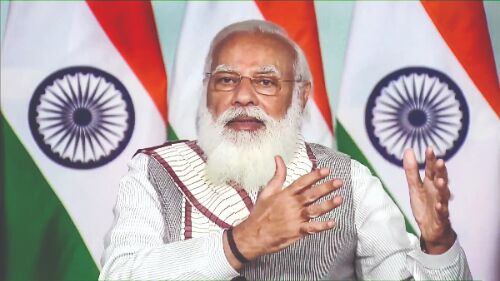India's health sector overcame trial by fire during Covid: PM

New Delhi: The prestige of India's health sector and trust in it has increased manifold across the globe after it successfully overcame the trial by fire during the COVID-19 pandemic last year, Prime Minister Narendra Modi said on Tuesday and asserted that time has come to take accessibility and affordability in healthcare to the next level.
Addressing a webinar on effective implementation of the Union Budget's provisions in the health sector, he said the budget allocated to health this year is unprecedented and shows the government's commitment to provide better healthcare.
Modi said his government is taking a holistic approach to healthcare and is not just focused on treatment but also wellness.
To keep India healthy, the government is working on four fronts simultaneously -- prevention of illness and promotion of wellness, providing cheap and effective treatment to the poorest of the poor, increasing quality and quantity of health infrastructure and healthcare professionals, and working on mission mode to overcome obstacles, Modi said.
The prime minister said it is time to take accessibility and affordability in healthcare to the next level for which use of modern technology is being increased, he said.
"Last year was in a way like 'agnipareeksha' (trial by fire) for the country and particularly for the health sector. I am happy that the country's health sector was successful in this 'agnipareeksha'. We managed to save so many lives," he said while crediting the achievement to combined efforts of the government and private sector.
The prime minister recalled how, within a few months, the country could set up a network of 2,500 labs and how it could reach a milestone of 21 crore tests from a mere dozen tests.
Modi said the pandemic has taught a lesson which is not just to fight the virus but prepare the country for any such future situation.
"From medical equipment to medicines, from ventilators to vaccines, from scientific research to surveillance infrastructure, from doctors to epidemiologists, we have to pay attention to all so that the country is better prepared for any health disaster in future," he said. This is the inspiration behind the PM Aatmanirbhar Swasth Bharat Scheme under which it has been decided that a modern ecosystem would be developed from research to testing and treatment in the country itself, he said.
The prime minister said as per the recommendations of the 15th Finance Commission, local bodies will get more than Rs 70,000 crore keeping health services in mind.
"The government's emphasis is not only on investment in health care but also to expand the access to health care in far flung areas of the country," he said.
During the pandemic, the strength shown by India's health sector, the power and experience it displayed has been closely noted by the world, Modi said.
In the whole world, the prestige of India's healthcare and the trust in it is at a new level, he asserted.
Modi said the demand for Indian doctors, nurses, paramedical staff, medicines and vaccines will increase across the world, and the country should be prepared for it.
He said a new trust has been established for Indian medicines and vaccines in the COVID period.
Modi said the world's attention would definitely shift towards India's medical education system and there would be a huge influx of foreign students to study medicine in India.
"We have to work faster after the great feat we achieved in manufacturing ventilators and equipment during the pandemic as there is an increased international demand for these," he said. He asked the participants, if India can dream of providing medical equipment to the world in a cost effective manner.
As opposed to the previous governments, the prime minister said the current government treats health issues in a holistic manner rather than in a fragmented manner. Therefore, the focus is on wellness and not just treatment, he said.
Protocols adopted in preventing coronavirus can also be adopted for preventing tuberculosis as the disease spreads through droplets of infected people, he said, highlighting that the country has set a target of eradicating TB by 2025.



